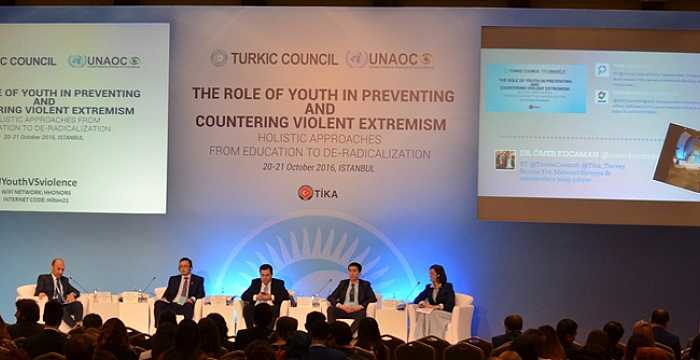Among the panels organized within the Conference on the Role of Youth in Preventing and Countering Violent Extremism, on 20th October 2016, the Panel I under the theme “Efforts of Governments and International Organizations to Prevent and Counter Violent Extremism with the Involvement of the Youth” was kicked off. The panelists were: Qaya Mammadov from the Ministry of Foreign Affairs of Azerbaijan (moderator); Bakyt Egemberdiev from the State Agency for Youth Affairs of Kyrgyzstan; Farhad Hajiyev from the Youth Foundation under the President of the Republic of Azerbaijan; Serik Beissembayev from the International research complex of Kazakhstan and Anna-Katharina Deininger Special Representative of the OSCE Chairmanship-in-Office on Youth and Security.
As preventing and countering Violent Extremism (P/CVE) is widely discussed by the governments and international organizations around the world since countries and societies are increasingly affected by violent extremism in different forms and manifestations, panelists emphasized the importance of governments in setting the policy framework, providing funding, and addressing structural issues regarding the efforts on P/CVE at the regional and global levels. Finding out the root-causes of the problems and innovating inclusive strategies were the main topics of debate in the Panel.
Bakyt Egemberdiev, briefed on the government efforts in his country regarding the programs on religious education at various levels including secondary schools and universities; establishing youth centers and creating business opportunities for young population. Mr. Egemberdiev expressed that religious illiteracy was the main reason of the spread of extremist ideology among the youth of Kyrgyzstan.
Farhad Hajiyev counted the internal tensions and external conflicts as the elements feeding the VE in Azerbaijan giving the conflict with Armenia as an example which led to over 1 million internally displaced persons. He prioritized education, employment and representation of the young people in government policies and projects. He specifically underlined the importance of the inclusion of the youth in preparation of the legislations regulating the lives of the youth. Mr. Hajiyev explained the existing effective channels in his country through which the youth become productive members of the society.
Serik Beissembayev, for his part, referred to social isolation of young people as one of the main reasons of the religious extremism. He shared the Kazakh government’s efforts to address this problem including funding sports facilities and educational programs to gather the youth together and contribute to their effective socialization. Mr. Beissembayev noted that there was a need for closer cooperation among the state agencies and more active involvement of international organizations on the issue.
Anna-Katharina Deininger presented on the awareness raising and outreach activities of the OSCE to the youth.
Throughout discussions, the lack of statistical data was mentioned as a main obstacle before conducting analytical studies on the involvement of youth in violent extremism. Furthermore, the question of growing number of the recruits among the well-educated and well off members of the societies in the ranks of the terrorist organizations was also addressed by the panelists. In answering this question, the panelists argued that social exclusion, psychological traumas, the tendency to believe in false religious promises for the perpetrators of violence, the motive for self-realization through exerting violence were among the factors behind this phenomenon.








